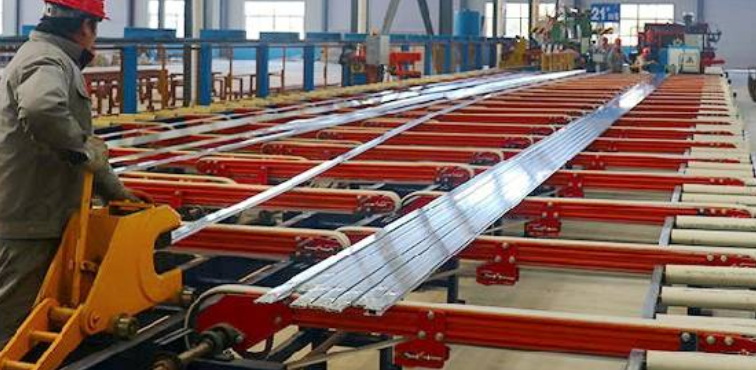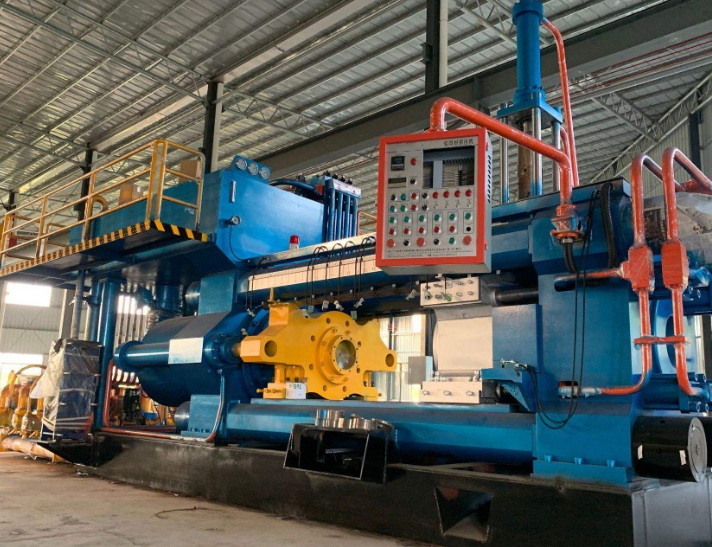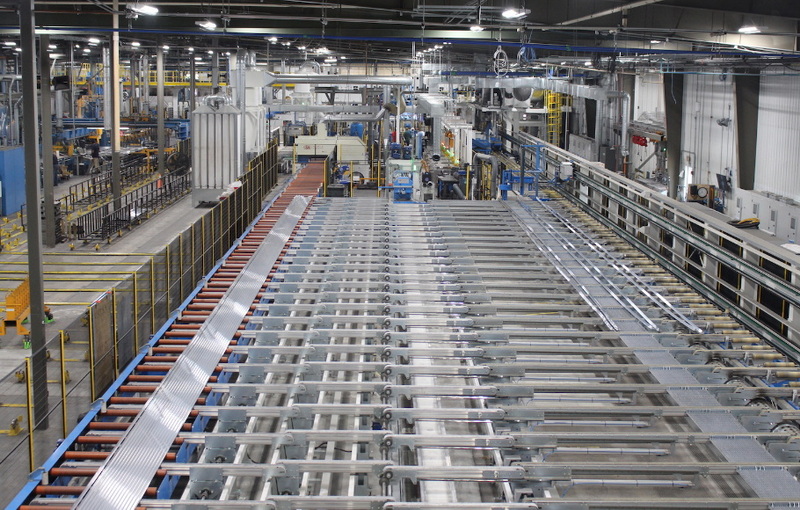Content Menu
● Introduction
● The Aluminum Extrusion Process
● Primary Responsibilities of an Aluminum Extrusion Press Operator
>> 1. Machine Setup and Operation
>> 2. Quality Control
>> 3. Maintenance and Troubleshooting
>> 4. Safety Compliance
>> 5. Record Keeping
● Skills and Qualities of a Successful Aluminum Extrusion Press Operator
● The Importance of Aluminum Extrusion Press Operators in Manufacturing
● Challenges Faced by Aluminum Extrusion Press Operators
● Career Growth and Opportunities
● Training and Education
● The Future of Aluminum Extrusion Press Operation
● Conclusion
● FAQ
>> 1. What qualifications are needed to become an aluminum extrusion press operator?
>> 2. What are the typical working hours for an aluminum extrusion press operator?
>> 3. How does an aluminum extrusion press operator ensure product quality?
>> 4. What safety precautions must an aluminum extrusion press operator follow?
>> 5. How is technology changing the role of aluminum extrusion press operators?
● Citations:
Introduction
Aluminum extrusion is a crucial process in manufacturing, transforming raw aluminum into various shapes and profiles used in countless industries. At the heart of this process is the aluminum extrusion press operator, a skilled professional responsible for managing and controlling the complex machinery that makes this transformation possible. This article will delve into the role of an aluminum extrusion press operator, exploring their responsibilities, skills, and the importance of their work in modern manufacturing.

The Aluminum Extrusion Process
Before we dive into the specific duties of an aluminum extrusion press operator, it's essential to understand the process they oversee. Aluminum extrusion involves forcing heated aluminum billets through a die to create specific shapes or profiles.
The process can be broken down into several steps:
1. Preheating the aluminum billet
2. Loading the billet into the extrusion press
3. Applying pressure to force the aluminum through the die
4. Cooling and stretching the extruded profile
5. Cutting the profile to desired lengths
6. Heat treating (if necessary)
7. Finishing and quality control
Throughout this process, the aluminum extrusion press operator plays a crucial role in ensuring efficiency, quality, and safety.
Primary Responsibilities of an Aluminum Extrusion Press Operator
1. Machine Setup and Operation
One of the most critical responsibilities of an aluminum extrusion press operator is setting up and operating the extrusion press. This involves:
- Selecting and installing the appropriate die for the desired profile
- Configuring machine controls
- Adjusting temperatures and pressures
- Monitoring the extrusion process to ensure materials are being shaped correctly and to specification
2. Quality Control
Maintaining product quality is paramount in aluminum extrusion. The operator must:
- Continuously inspect extruded products for defects
- Make necessary adjustments to machine settings to maintain high-quality standards
- Ensure that created products meet the required specifications
3. Maintenance and Troubleshooting
To keep the extrusion press running smoothly, operators must:
- Conduct routine maintenance tasks such as cleaning and lubricating machinery
- Perform minor repairs on the equipment
- Identify and solve problems in the production process
- Replace defective, broken, or expired machinery components
4. Safety Compliance
Safety is a top priority in any manufacturing environment. Aluminum extrusion press operators must:
- Adhere to all safety protocols and regulations
- Wear appropriate personal protective equipment (PPE)
- Ensure the work area remains clean and free of hazards
- Report any safety concerns or incidents immediately
5. Record Keeping
Accurate documentation is crucial for quality assurance and process improvement. Operators are responsible for:
- Maintaining detailed logs of production events during each shift
- Recording and reviewing quality check sheets consistently
- Documenting any issues or adjustments made during the extrusion process

Skills and Qualities of a Successful Aluminum Extrusion Press Operator
To excel in this role, an aluminum extrusion press operator should possess:
1. Technical Proficiency: Understanding of mechanical and thermal dynamics of the extrusion process
2. Attention to Detail: Ability to carefully monitor and adjust machine settings for precise results
3. Problem-Solving Skills: Capability to quickly diagnose and fix issues that arise during the extrusion process
4. Physical Stamina and Strength: Capacity to handle heavy materials and equipment
5. Safety Consciousness: Vigilance in maintaining a safe work environment
6. Communication Skills: Ability to effectively communicate with team members and supervisors
The Importance of Aluminum Extrusion Press Operators in Manufacturing
Aluminum extrusion press operators play a vital role in the manufacturing industry. Their expertise ensures the production of high-quality aluminum profiles used in various sectors, including:
- Construction (window frames, door frames, structural components)
- Automotive (body parts, heat sinks)
- Aerospace (aircraft components)
- Electronics (heat sinks, casings)
- Consumer goods (furniture, appliances)
By maintaining efficient and precise extrusion processes, these operators contribute significantly to the overall productivity and success of manufacturing operations.
Challenges Faced by Aluminum Extrusion Press Operators
While rewarding, the role of an aluminum extrusion press operator comes with its share of challenges:
1. Physical Demands: The job can be physically taxing, requiring operators to stand for long periods and handle heavy equipment.
2. Attention to Detail: Constant vigilance is necessary to maintain product quality and catch any defects.
3. Pressure to Meet Production Targets: Operators must balance quality with efficiency to meet production goals.
4. Adapting to New Technologies: As extrusion technology evolves, operators must continually update their skills and knowledge.
Career Growth and Opportunities
For those interested in pursuing a career as an aluminum extrusion press operator, there are several paths for growth and advancement:
1. Senior Operator: With experience, operators can take on more responsibility and oversee multiple presses or shifts.
2. Supervisor or Team Lead: Experienced operators may move into management roles, overseeing teams of operators.
3. Quality Control Specialist: Some operators transition into roles focused on maintaining and improving product quality.
4. Maintenance Technician: The technical knowledge gained as an operator can lead to specialized maintenance roles.
5. Process Engineer: With additional education, operators can move into engineering roles, designing and optimizing extrusion processes.
Training and Education
While many aluminum extrusion press operators learn through on-the-job training, formal education can be beneficial. Some relevant educational paths include:
- Vocational training in manufacturing or metalworking
- Associate's degree in manufacturing technology or related fields
- Certifications from industry organizations like the Aluminum Extruders Council
Continuous learning is crucial in this field, as technology and processes are constantly evolving.
The Future of Aluminum Extrusion Press Operation
As with many manufacturing roles, the job of an aluminum extrusion press operator is evolving with technological advancements. Some trends shaping the future of this profession include:
1. Automation: Increased use of automated systems to assist with press operation and quality control
2. Data Analytics: Utilization of big data to optimize extrusion processes and predict maintenance needs
3. Sustainability: Focus on energy-efficient processes and recycling of aluminum scrap
4. Advanced Materials: Development of new aluminum alloys requiring specialized extrusion techniques
Despite these changes, the expertise of skilled operators remains invaluable in ensuring the quality and efficiency of aluminum extrusion processes.
Conclusion
Aluminum extrusion press operators play a crucial role in modern manufacturing, bridging the gap between raw materials and finished products. Their expertise in operating complex machinery, attention to detail, and problem-solving skills are essential for producing high-quality aluminum profiles used across various industries. While the job comes with its challenges, it also offers opportunities for growth and the satisfaction of contributing to tangible, widely-used products.
As technology continues to advance, the role of aluminum extrusion press operators will evolve, requiring continuous learning and adaptation. However, the core skills of technical proficiency, attention to detail, and safety consciousness will remain fundamental to success in this field. For those interested in a hands-on career in manufacturing, becoming an aluminum extrusion press operator offers a rewarding path with ample opportunities for growth and development.

FAQ
1. What qualifications are needed to become an aluminum extrusion press operator?
While specific requirements may vary by employer, most aluminum extrusion press operators need a high school diploma or equivalent. Some companies may prefer candidates with vocational training or an associate's degree in manufacturing technology. Essential skills include mechanical aptitude, attention to detail, and the ability to follow safety procedures. On-the-job training is typically provided to new operators.
2. What are the typical working hours for an aluminum extrusion press operator?
Aluminum extrusion press operators often work in shifts, as many manufacturing facilities operate 24/7. Shifts can include days, nights, weekends, and holidays. A standard shift is usually 8 or 12 hours long. Some operators may be required to work overtime during busy periods or to cover for absent colleagues.
3. How does an aluminum extrusion press operator ensure product quality?
Aluminum extrusion press operators ensure product quality through several methods:
- Continuous monitoring of the extrusion process
- Regular inspection of extruded profiles for defects
- Adjusting machine settings as needed to maintain quality
- Conducting routine quality checks and measurements
- Documenting production data and any quality issues
- Collaborating with quality control teams to address any problems
4. What safety precautions must an aluminum extrusion press operator follow?
Safety is paramount in aluminum extrusion. Operators must:
- Wear appropriate personal protective equipment (PPE), including safety glasses, gloves, and steel-toed boots
- Follow all lockout/tagout procedures when performing maintenance
- Adhere to proper machine operation procedures
- Maintain a clean and organized work area
- Report any safety hazards or incidents immediately
- Participate in regular safety training and meetings
5. How is technology changing the role of aluminum extrusion press operators?
Technology is significantly impacting the role of aluminum extrusion press operators:
- Increased automation is assisting with press operation and quality control
- Advanced sensors and monitoring systems provide real-time data on machine performance
- Computer-controlled extrusion presses require operators to have basic computer skills
- Data analytics are being used to optimize processes and predict maintenance needs
- Virtual reality and augmented reality are being implemented for training purposes
These technological advancements are requiring operators to continually update their skills and adapt to new systems.
Citations:
[1] https://www.indeed.com/career-advice/finding-a-job/what-does-extrusion-operator-do
[2] https://www.rssinc.com/blog/what-is-an-extrusion-machine-operator/
[3] https://www.qwikresume.com/resume-samples/extrusion-press-operator/
[4] https://aec.org/aluminum-extrusion-process
[5] https://www.youtube.com/watch?v=Xb433pd4JTY
[6] https://www.youtube.com/watch?v=iiGlq7408ME
[7] https://www.linkedin.com/pulse/four-precautions-aluminum-extrusion-machine-operators-when-operating
[8] https://www.reddit.com/r/engineering/comments/29c5yf/just_started_a_new_job_as_an_aluminum_extrusion/
[9] https://climbtheladder.com/extrusion-operator-interview-questions/
[10] https://www.jobbank.gc.ca/marketreport/occupation/10130/ca;jsessionid=B8EA8A5FE74CF8CC94FB355C6C8068BE.jobsearch75
[11] https://www.alamy.com/stock-photo/extrusion-press.html






















